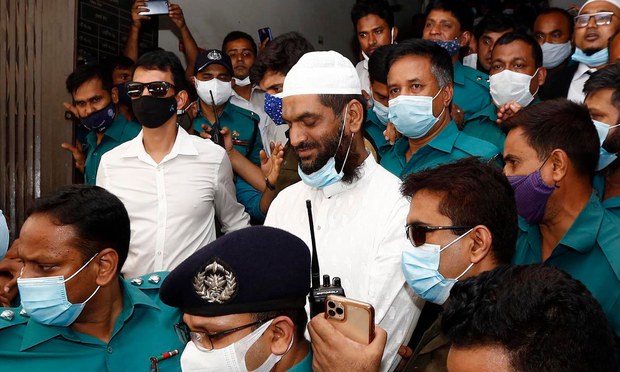Bangladesh Police to Question Leader of Hardline Muslim Group
2021.04.19
Dhaka
 Mamunul Haque, joint secretary-general of Hefazat-e-Islam, arrives at a court in Dhaka, April 19, 2021.
Mamunul Haque, joint secretary-general of Hefazat-e-Islam, arrives at a court in Dhaka, April 19, 2021.
A Dhaka court on Monday permitted police to question a top leader of Bangladesh’s most influential conservative Islamic group after its violent protests against the Indian prime minister’s visit last month cast a pall over the country’s 50th anniversary celebration.
The weekend arrest of Mamunul Haque was the government’s latest move against Hefazat-e-Islam, which has distanced itself from the ruling Awami League since the group’s previous head died last September.
Police have arrested more than 400 Hefazat members since Narendra Modi, India’s leader, traveled to Bangladesh in late March. Authorities claim that many of the arrests are linked to cases stemming from before the PM’s visit.
The police produced Haque, Hefazat’s joint secretary-general, before the court on Monday seeking that he be remanded to their custody for questioning, said Jafar Hossain, a deputy police commissioner.
“The court rejected the bail petition and granted a seven-day police remand for questioning Mamunul Haque,” Hossain said.
The Hefazat leader was picked up for alleged violence in a case filed in March 2020 in Dhaka, Harun-or-Rashid, the deputy police commissioner who led Haque’s arrest from a Dhaka madrassa on Sunday, told journalists.
Prosecutor Abdullah Abu urged the court not to grant Haque bail.
“Mamunul Haque has been involved in many violent activities. He incited violence. So he should be remanded to get information from him,” Abu told reporters at the court premises.
Five other senior leaders of Hefazat – which wants the imposition of sharia law – were also arrested over the weekend, Hossain said.
Since the March 26-27 anti-Modi violence, police and individuals have filed at least 84 cases – including lawsuits under the stringent Anti-Terrorism Act – in connection with the protests that left at least 18 people dead.
Haque’s lawyer, Zaynal Abedin Mesbah, believes the case against his client was politically motivated.
“The government arrested Mamunul Haque on political grounds. The allegations leveled against my client are baseless,” Mesbah told BenarNews.
“This is a one-year-old case. The police remained idle. Given the latest political developments over Narendra Modi’s visit, the police suddenly became active and arrested him.”
‘Cases are enough to tame Hefazat’
In parliament earlier this month, Prime Minister Sheikh Hasina mentioned Hefazat by name when she warned about legal action against all those who participated in the violence during Modi’s visit.
“Hefazat leader Mamunul [Haque] set vehicles on fire and attacked people... I want to ask... Islam is a religion of peace, how did these Hefazat militants attack [the] public?” Hasina said, according to the Indo-Asian News Service.
The same PM, last September, had expressed shock and sorrow at the death of Hefazat founder Ahmed Shafi, according to the state-run news agency Bangladesh Sangbad Sanstha.
A scant seven years before Hasina shared this sentiment on Shafi’s death, her government had mobilized the police to end – some say violently – a massive Hefazat rally in Dhaka.
The Islamic group – which runs thousands of religious schools in the country – had demanded the introduction of Sharia law, including a blasphemy law, during the May 2013 rally.
The Awami League, a party with roots in secularism, didn’t implement Sharia law. But as the 2018 elections loomed, the party decided to court the support of faith-based groups to counter the opposition and fell in with Hefazat.
In April 2017, Hasina announced that her government would recognize degrees from thousands of Qwami madrassas – Islamic boarding schools - that Hefazat runs. She also agreed to changes in public school textbooks to make them more “Muslim-friendly,” as demanded by the group.
The death of the Hefazat founder last year, and the ascendance of a pro-opposition faction’s member as the group’s leader brought about a change in Hasina’s relationship with Hefazat – marking the beginning of the end of the government’s honeymoon with the hardline Islamic group, analysts said.
The Awami League could not control Hefazat after Shafi’s death and after Junaid Babunagari gained control of the group with other leaders like Haque, said Nizam Uddin Ahmed, a political commentator and academic.
“Mamunul Haque mainly led Hefazat’s opposition to Modi’s visit. The arrests are the consequences of the violence over Narendra Modi’s visit, no matter whatever the police say,” Ahmed told BenarNews.
Afsan Chowdhury, a political researcher and writer, concurred with Ahmed.
“The government does not want Hefazat under Babunagari-Mamunul leadership, they want Shafi’s son. The anti-Modi protest has given the government an opportunity to regulate Hefazat,” Chowdhury told BenarNews.
He believed the hundreds of recent arrests of Hefazat members and the dozens of cases filed against the group have sent Hefazat a clear and strong message.
“These cases are enough to tame Hefazat, which [now] must yield to the government. A change in Hefazat leadership would not be surprising,” Chowdhury said.







